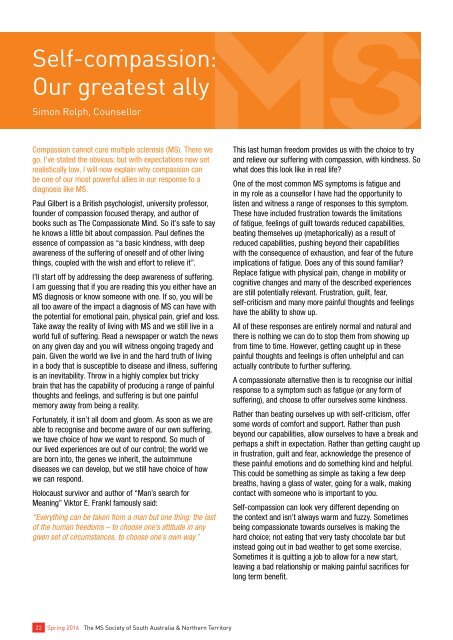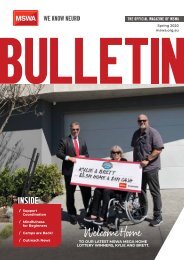You also want an ePaper? Increase the reach of your titles
YUMPU automatically turns print PDFs into web optimized ePapers that Google loves.
Self-compassion:<br />
Our greatest ally<br />
Simon Rolph, Counsellor<br />
Compassion cannot cure multiple sclerosis (MS). There we<br />
go. I’ve stated the obvious; but with expectations now set<br />
realistically low, I will now explain why compassion can<br />
be one of our most powerful allies in our response to a<br />
diagnosis like MS.<br />
Paul Gilbert is a British psychologist, university professor,<br />
founder of compassion focused therapy, and author of<br />
books such as The Compassionate Mind. So it’s safe to say<br />
he knows a little bit about compassion. Paul defines the<br />
essence of compassion as “a basic kindness, with deep<br />
awareness of the suffering of oneself and of other living<br />
things, coupled with the wish and effort to relieve it”.<br />
I’ll start off by addressing the deep awareness of suffering.<br />
I am guessing that if you are reading this you either have an<br />
MS diagnosis or know someone with one. If so, you will be<br />
all too aware of the impact a diagnosis of MS can have with<br />
the potential for emotional pain, physical pain, grief and loss.<br />
Take away the reality of living with MS and we still live in a<br />
world full of suffering. Read a newspaper or watch the news<br />
on any given day and you will witness ongoing tragedy and<br />
pain. Given the world we live in and the hard truth of living<br />
in a body that is susceptible to disease and illness, suffering<br />
is an inevitability. Throw in a highly complex but tricky<br />
brain that has the capability of producing a range of painful<br />
thoughts and feelings, and suffering is but one painful<br />
memory away from being a reality.<br />
Fortunately, it isn’t all doom and gloom. As soon as we are<br />
able to recognise and become aware of our own suffering,<br />
we have choice of how we want to respond. So much of<br />
our lived experiences are out of our control; the world we<br />
are born into, the genes we inherit, the autoimmune<br />
diseases we can develop, but we still have choice of how<br />
we can respond.<br />
Holocaust survivor and author of “Man’s search for<br />
Meaning” Viktor E. Frankl famously said:<br />
“Everything can be taken from a man but one thing: the last<br />
of the human freedoms – to choose one’s attitude in any<br />
given set of circumstances, to choose one’s own way.”<br />
This last human freedom provides us with the choice to try<br />
and relieve our suffering with compassion, with kindness. So<br />
what does this look like in real life?<br />
One of the most common MS symptoms is fatigue and<br />
in my role as a counsellor I have had the opportunity to<br />
listen and witness a range of responses to this symptom.<br />
These have included frustration towards the limitations<br />
of fatigue, feelings of guilt towards reduced capabilities,<br />
beating themselves up (metaphorically) as a result of<br />
reduced capabilities, pushing beyond their capabilities<br />
with the consequence of exhaustion, and fear of the future<br />
implications of fatigue. Does any of this sound familiar?<br />
Replace fatigue with physical pain, change in mobility or<br />
cognitive changes and many of the described experiences<br />
are still potentially relevant. Frustration, guilt, fear,<br />
self-criticism and many more painful thoughts and feelings<br />
have the ability to show up.<br />
All of these responses are entirely normal and natural and<br />
there is nothing we can do to stop them from showing up<br />
from time to time. However, getting caught up in these<br />
painful thoughts and feelings is often unhelpful and can<br />
actually contribute to further suffering.<br />
A compassionate alternative then is to recognise our initial<br />
response to a symptom such as fatigue (or any form of<br />
suffering), and choose to offer ourselves some kindness.<br />
Rather than beating ourselves up with self-criticism, offer<br />
some words of comfort and support. Rather than push<br />
beyond our capabilities, allow ourselves to have a break and<br />
perhaps a shift in expectation. Rather than getting caught up<br />
in frustration, guilt and fear, acknowledge the presence of<br />
these painful emotions and do something kind and helpful.<br />
This could be something as simple as taking a few deep<br />
breaths, having a glass of water, going for a walk, making<br />
contact with someone who is important to you.<br />
Self-compassion can look very different depending on<br />
the context and isn’t always warm and fuzzy. Sometimes<br />
being compassionate towards ourselves is making the<br />
hard choice; not eating that very tasty chocolate bar but<br />
instead going out in bad weather to get some exercise.<br />
Sometimes it is quitting a job to allow for a new start,<br />
leaving a bad relationship or making painful sacrifices for<br />
long term benefit.<br />
We have many different relationships, whether with friends<br />
or family but the most important relationship we have is with<br />
ourselves. We are constantly in our own company and at<br />
some point we all experience pain. At that point we have a<br />
choice. We can criticise ourselves, beat ourselves up, react<br />
in an unhelpful way. Or we can recognise our suffering, offer<br />
ourselves some support and kindness and be our own best<br />
friend. Neither will change the initial cause of the suffering<br />
but depending on the approach, the experience itself can be<br />
vastly different.<br />
Being compassionate towards ourselves can be<br />
challenging. Maybe we haven’t had much practice at<br />
being self-compassionate. Maybe we have a belief that<br />
kindness and compassion are a sign of weakness. Maybe<br />
we believe that self-criticism can be motivating and to<br />
be honest, it can be at times. But take a moment and<br />
imagine having a donkey to carry your goods to market<br />
(trust me, this is relevant).<br />
For your career as a trader to succeed, you need your<br />
donkey to transfer your products on a daily basis. How do<br />
you do this? Well, you could whip the donkey and cause pain<br />
as motivation to move forward. Or you could dangle a carrot<br />
in front of the donkey, offer support, encouragement and<br />
kindness and reward your trusty steed when you arrive at<br />
the market. Either of these approaches can get the desired<br />
result but in the long term the punished donkey will likely<br />
feel anxious, depressed, have no desire to be loyal and<br />
ultimately lead a rather unhappy existence. The rewarded<br />
donkey may not always get the goods to market on time,<br />
but will be motivated, have a far kinder and trusting<br />
relationship with its owner and will likely have a more<br />
content and meaningful life than the punished donkey.<br />
The choice we have then is what kind of owner do we want<br />
to be to ourselves?<br />
For further information on Paul Gilbert, compassion<br />
and a range of relevant books, audio and video content,<br />
please visit the following website:<br />
compassionatemind.co.uk/about-us<br />
22 <strong>Spring</strong> 20<strong>16</strong> The MS Society of South Australia & Northern Territory The MS Society of South Australia & Northern Territory <strong>Spring</strong> 20<strong>16</strong> 23


















